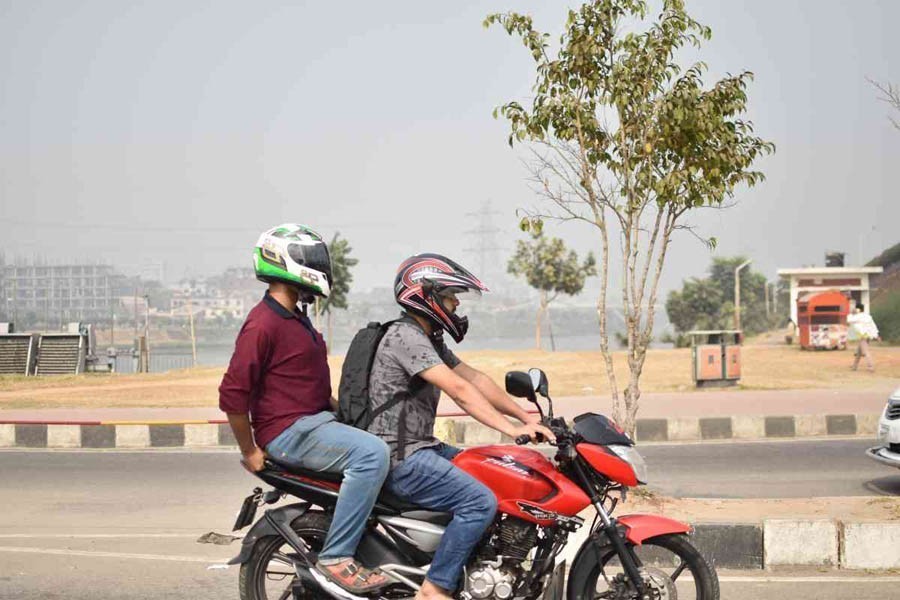
Case for road-friendly motorbikes
Shihab Sarkar | Monday, 5 April 2021

After a considerably long gap, motorbikeshad just started roaring along the Dhaka streets. Apart from the large and small private bikes, the ubiquitous ride-sharing ones also resumed their self-styled dominance in the capital. Just at that time the Covid-19 pandemic witnessed its resurgence, this time in an increased ferocity. Amid government closures of many public movements and activities, the ride-sharing motorbikes fell under a 14-day restriction on their service in the capital. It was before the April 3 announcement of the countrywide lockdown. The ride-sharing motorcycle operators opposed the restraining measure, citing their loss of income caused by the 14-day ban. Now they are barred from roads altogether, at least for now.
Considering their past record of reckless movement in Dhaka, the road users expected the motorcyclists todemonstrate restraint in their movement after the previous Covid-19 shutdown. Unfortunately, it didn't happen. The presence of motorcycles in general, however, was thin for some time. It was because a sizeable number of motorbike-using commuters had yet to resume their daily movement. On the other hand, many of the ride-sharing bike drivers had yet to come back to the capital from their village homes.
In normal times the major and neighbourhood roads in Dhaka remain filled with the two-wheelers. Theirwhizzing past the other modes of transport in deafening sounds is a common sight.Many think the motorbikes' return depends on the Covid-19 situation in the coming days. The motorbikes in general had just begun moving on the major roads in their usual'caravans'. Normally, their impenetrably concentrated presence at the traffic red light at times appears to be a spectacle to watch. Not all the motorbikes remain fully under brakes at the signal. A number of them become impatient at the long wait, believing the on-duty traffic police keeping the other side open 'wilfully'. Being tired of being stuck up at the signal, they start moving forward stealthily. However, appalling scenes occur before the moving traffic issignalled to stop atcritical intersections. A number of motorbikes do not care a fig about the traffic red light or manual signals. They speed away, squeezing past the vehicles waiting for the traffic personnel to give them a go-ahead. It leads toaccidents, especially when the frantically speeding motorbikes hit a pedestrian crossing the road.
The residents of Dhaka have lately become used to the reckless movements of the motorbikes. Alongside the private ones, the 2-wheelers under the ambit of ride-hailing companies have been a usual spectacle for some time. No doubt, lots of commuters benefit from the ride-sharing bikes. A number of Dhaka's traffic movement experts, however, point the finger at these app-based two-wheelers for the chaotic traffic movements and widespread gridlocks on the major roads.These unwarranted situations are caused by the motorbike drivers' eagerness to carry the pillion passengers to their destinations as soon as possible.
In theory, motorbikes are road-friendly. When it comes to movement of various types of traffic, few show reservations about motorbikes moving alongside them. They occupy little space, hardly pollute the air and make little noise, unless there is trouble with the silencer. Even the jet-black giant 'Triumph' motorcycles, a few of which would move on the Dhaka streets in the 1960s, made little sound. While on the move, these UK-made motorcycles used to make a low-volume but majestic roar. The Japanese and Italian motorcycle-makers came up with two great gifts for Dhaka's middle and lower-middle classes in the mid-sixties.Japan's50cc and 150cclight Honda motorcycles and the Italian Scooter brand of Vespa soon emerged as two popular motorcycles in the cities, especially Dhaka.
To the affluent younger generations the smart-looking motorbikes serve as a symbol of masculinity. When they are astride on a high-cc motorbike, their macho-related ego undergoes enormous boost. A recklessness of sorts overwhelms them. It is these derring-do youths and their bikes which make the general road users feel scared. But at the same time, due to their affordable price middle-class individual commuters increasingly turned to them. Even small families with a couple of small children are nowadays seen buying these motorbikes. A whole 3 to 4-memberfamily (including kids) travelling on precariously traffic-filled roads is a common scene in Dhaka.Most of the time, they are found without helmets.But riding motorbikes, that too taking a whole family, and travelling places sans helmets, may lead to fatal accidents. However, many conscious segments of motorcycle riders have lately started arranging helmets for all the pillion passengers, barring the small babies.
According to experts in the socio-economic reality of Bangladesh, motorcycles are increasingly emerging as an easily affordable 'family transport' in Dhaka.Their price being lower than small cars, and the fact that they don't need a driver motorcycles offer ample scopes for manoeuvrability on all types of roads. They are equally accessible to both traffic-filled busy roads and narrow alleys. What makes them often an eyesore in the city is their plying the roads in an over-capacity manner. That, too, could be allowed considering the insolvency of many families concerned. But it cannot be overlooked when it comes to the mandatory compliance of wearing helmets while travelling on a motorbike.
Compelling the travellers to wear helmets doesn't benefit the traffic police. The rule is enforced in order to make the travels of the riders and their pillion passengers safe and hazard-free.Most of the defiant motorcyclists, however, wear helmets. But their compliance with the traffic rule becomes a fiasco, as they speed along the roads, and evenflyovers, with least care for their own, and others' safety.Smaller vehicles often have to pay the price of the motorcycles' frenzied speed. Many of the motorbikes are found brushing against luxury cars or making dent on their bodies. All these irregularities warrant stringent remedial measures.